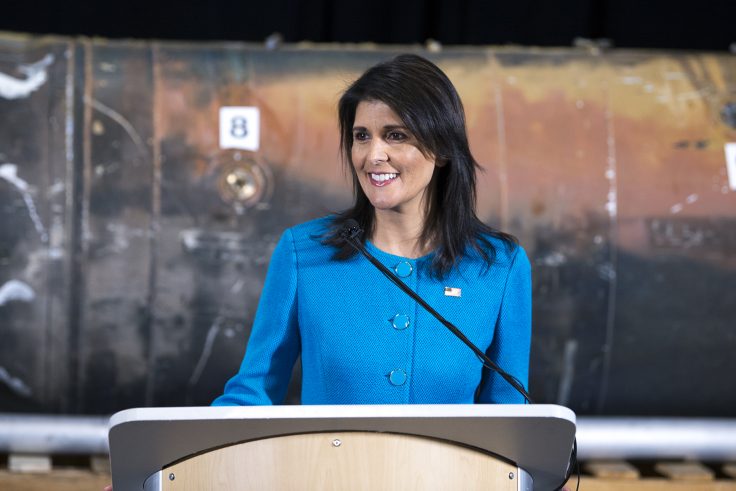The Biden administration’s $2.35 billion investment in Taliban-controlled Afghanistan is emerging as a flashpoint in the 2024 presidential race, with Republican presidential hopeful Nikki Haley vowing to cut all U.S. aid to the country.
"When I’m president, we won’t send one penny to terrorists and countries that hate America," former United Nations ambassador Nikki Haley told the Washington Free Beacon on Wednesday. "Nearly two years after Joe Biden’s disastrous withdrawal from Afghanistan, he continues to add insult to injury by throwing taxpayer dollars at the Taliban-controlled country. This is a terrorist regime that killed our troops and tortures its own people."
Afghanistan—and the Biden administration’s deadly 2021 evacuation from the country that left 13 Americans dead—has become a major talking point among the GOP’s 2024 field of candidates as they seek to brandish their foreign policy credentials. Former vice president Mike Pence has repeatedly slammed the Biden administration for removing all U.S. forces from the country, and his former boss, Donald Trump, also blamed the current president for the Taliban’s rise to power. Florida governor Ron DeSantis had made similar comments about the bungled U.S. withdrawal, though he hasn’t focused heavily on foreign policy up to this point.
Haley’s comments are some of the clearest to date from a Republican candidate about what U.S. policy towards Afghanistan would look like moving forward. The Biden administration has pumped taxpayer cash into the country since the Taliban retook power, and the United States remains the war-torn country’s top patron, the Free Beacon reported on Tuesday. This cash is believed to be propping up the Taliban’s government.
Haley has also come out in favor of cutting foreign aid to a range of countries she says "hate America." These include Iraq, Pakistan, Zimbabwe, Belarus, and Cuba.
Haley, who led efforts during her time at the United Nations to cut ties with a range of organizations known for their anti-Israel bias, also has proposed cutting U.S. donations to the U.N. Relief and Works Agency, a humanitarian group that works primarily in the Palestinian territories and is known to employ terrorist sympathizers.
While domestic issues and the country’s ailing economy rank as the top issues for voters, foreign policy could play a role in the 2024 contest due to the Biden administration’s chaotic withdrawal from Afghanistan and the U.S. government's aid to Ukraine in its ongoing war against Russia.
Afghanistan continues to drive down President Joe Biden’s poll numbers, which took a dive following the 2021 withdrawal and continue to suffer as a result, according to NPR polling.
The issue could remain a talking point for Republican candidates as the Republican-controlled House conducts investigations into the Afghanistan debacle that have already shown the Biden administration ignored early warnings about a brewing catastrophe and made many missteps throughout the evacuations.
"There was very little intelligence to suggest the Biden administration’s plan would work and a mountain range of evidence to suggest the plan would fail," retired Col. Seth Krummrich, former chief of staff for special operations at U.S. Central Command, told lawmakers during a hearing late last month.
Richard Goldberg, a former White House National Security Council member during the Trump administration, said that Afghanistan is certain to rank as a top foreign policy priority as the 2024 election continues to heat up.
"The withdrawal from Afghanistan is really at the core of so many issues that will be at the center of public debate for the next 15 months," said Goldberg, who currently serves as a senior adviser to the Foundation for Defense of Democracies think tank. "The perception of U.S. weakness and decline, the greenlight for Russia to invade Ukraine, increased threats from the Chinese Communist Party, a radical Islamic regime in Tehran on the doorstep of nuclear threshold status, and, of course, the rising terrorism threat we now face from inside Afghanistan itself."
